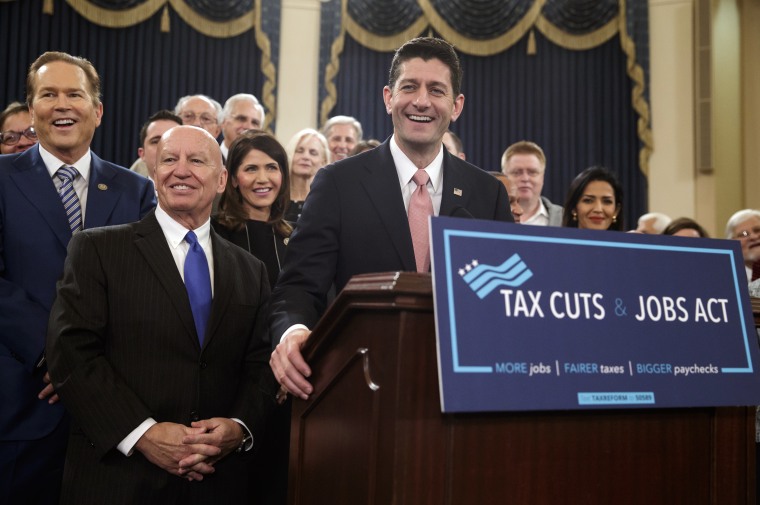After Republicans rushed through their massive, regressive tax plan late last year, many assumed the GOP majority would turn its attention to other issues, such as infrastructure or immigration. What we didn't realize is that Republicans would instead keep their focus on ... more tax cuts.
As we discussed in the spring, Donald Trump told a selected group of supporters in St. Louis, in reference to his tax plans for 2018, "We're now going for a Phase 2." Pointing to House Ways and Means Committee Chairman Kevin Brady (R-Texas), the president added, "It's going to be something very special. Kevin Brady's working on it with me."
In this case, Trump apparently wasn't making stuff up. Brady told Fox Business at the time that Republicans believe "even more can be done" on taxes.
We're now getting a look at what they have in mind. Reuters reported overnight:
With congressional elections looming, Republicans in the U.S. House of Representatives on Monday proposed more deficit-expanding tax cuts, an effort seen by some tax experts as unlikely to become law and geared chiefly toward winning votes.Even if the initiative fails to pass, it could put Democrats in the position of opposing the new tax-cut plan on the House floor, which Republicans could seek to use to their advantage in the Nov. 6 elections where control of Congress will be at stake.Under the measure, federal individual income tax cuts approved on a temporary basis by the Republican-controlled Congress and President Donald Trump in December would become permanent.
This should probably sound familiar. As part of their accounting tricks, Republican lawmakers created permanent tax breaks for big corporations, but temporary tax breaks for the public. "Phase 2," to borrow the president's phrase, is about making the latter permanent, too.
If this seems like a cheap gimmick, there's a good reason for that. GOP leaders almost certainly don't expect another round of regressive tax breaks to pass, but by holding a vote shortly before the midterm elections, they will likely use the demise of their plan as fodder for attack ads -- with Republicans accusing Democrats of opposing "tax relief" for "American families."
There is, however, a problem with the plan.
Even if we put aside the many substantive concerns -- including the fact that GOP officials aren't even trying to come up with a way to pay for another round of tax cuts -- the politics aren't as clear as Republican leaders would like. In fact, Politico reported this week that they're facing some opposition to the plan from their own conference.
GOP leaders conceived of the second tax bill as a messaging win that would put Democrats on their heels ahead of the midterms, forcing them to vote against tax relief for the middle class. But the concerns over the bill are largely flowing from the Republican side, mainly from members fighting to keep hold of seats in suburban districts where President Donald Trump is most unpopular -- and that are key to the GOP's hopes of keeping their majority.A dozen House Republicans, all but one of them from the high-tax states of California, New Jersey and New York, voted against the tax law in December because it capped state and local tax deductions, which they said would lead to tax increases on too many of their constituents.Some of those GOP lawmakers have openly said they would prefer to leave the tax issue alone as Congress also grapples with how to fund the government and the House potentially votes on health care measures that might be more politically beneficial to vulnerable incumbents. "If we were to pass that here in the House, it would be an exercise in futility, because it could never pass in the Senate," Rep. Leonard Lance of New Jersey, who opposed the first bill, said Friday on CNBC.
The concerns are rooted in a certain logic: if the public is already opposed to the Republican Party's tax policies, and "Phase 2" can't pass, maybe it's unwise to pick another fight over tax policy so close to Election Day.
Will GOP leaders ignore the concerns and advance the gimmick anyway? Watch this space.
